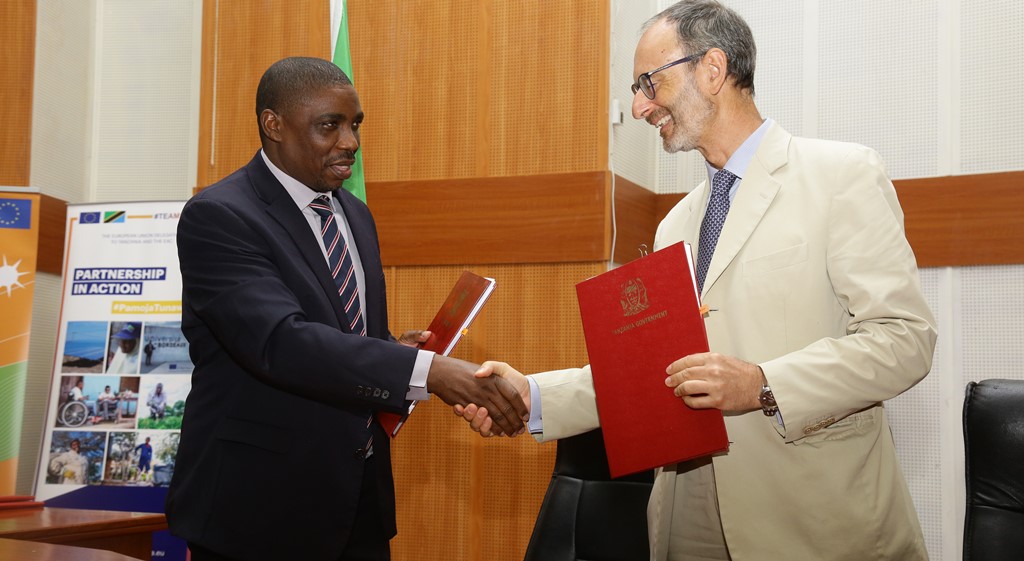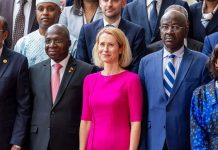AfricaPress-Tanzania: TANZANIA and the European Union (EU) have signed six new financing agreements worth 308bn/-, under the framework of the 11th European Development Fund (EDF) and National Indicative Programme (NIP).
The four-year financing agreements were signed on Tuesday by Permanent Secretary in the Ministry of Finance and Planning Dotto James and EU Ambassador to Tanzania Manfredo Fanti.
The agreements are for Tanzania energy sector reform programme, integrated approach for sustainable cooking solutions, REA Rider for health/water facilities and beekeeping value chain programme.
Others are strengthening plant health services for enhanced food safety, support for business environment, growth and innovation and technical cooperation facility-Phase II.
Speaking after signing the agreements, Mr James said the EU is one of the key strategic partners in terms of supporting government’s efforts in achieving sustainable development.
The pay master general said the partnership can be substantiated by the sizable financial support that the EU has extended to Tanzania since 1975.
“So far, Tanzania has received from EU about 6.6tri/- as grant and a total of 748.2bn/- as concessional loan from the European Investment Bank,” he revealed.
He said “the funds have supported interventions in various sectors including macroeconomic, sector policies, road transport, airports, energy, agriculture as well as environment and climate change.”
Moreover, Mr James said the signed agreements have been oriented towards needs and challenges identified in the National Development Plans.
Elaborating, he said the energy sector reform programme allocated with 96.7bn/- will enhance the sustainable development of the sector, specifically improving service delivery including availability, affordability, acceptability and quality.
The integrated approach to sustainable cooking solution agreement worth 82.8bn/- aim to contribute to reduced climate change impact in the country, by ensuring increased production of sustainable wood-fuel in rural areas.
He said the support to beekeeping value chain, which is allocated with 27.6bn/- is for enhancement of the industry contribution to inclusive economic growth by producing high quality honey in an environmental and climate-friendly manner.
Other agreement is a 27.6bn/- for strengthening plant health services for enhanced food safety and increased access to safe and quality agricultural produce for national and international markets.
A sum of 63.5bn/- is set aside for the business environment, growth and innovation, which advocates to promote inclusive economic growth, employment and innovation among women and youth and enhance consumer protection.
Last agreement signed was technical cooperation facility-phase II, which is allocated with 9.7bn/- to support the completion of 11th EDF projects, identification and formulation of projects under the Multiannual financial framework.
Mr James said as the contracting authority for the financing agreements, they will provide the needed technical guidance to ensure the funds are utilised in a manner of value for money, while adhering to EDF and government procedures.
On his part, EU Ambassador said they do not oversee themselves as funds providers but an active partner in the country’s efforts of development by means of dialogue, exchange of experiences and human contacts.
“We are happy to discuss with our partners what we in the EU have learnt from our achievements and from our mistakes,” he said
He added that they clearly see the country’s potential to improve the livelihoods of the people and move forward on industrialization and sustainable growth,
Mr Fanti insisted that sometimes the immediate impact of the EU funded projects is difficult to explain to the public because they cannot touch, but contributing more to sustainable energy management and quality and safety of the country’s products is of essential importance for the economy.







